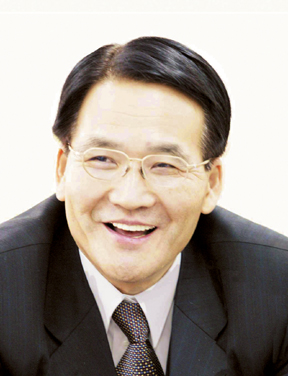ETRI's Technology Breakthrough
The research institute develops wireless 1394 UWB system
 The Electronics and Telecommunications Research Institute (ETRI) developed a wireless 1394 UWB system, which is able to record a two-hour film on a mobile phone located 10 meters away and operate TV and PC peripheral equipment with a mobile phone without a wire connection, the institute said recently.
The Electronics and Telecommunications Research Institute (ETRI) developed a wireless 1394 UWB system, which is able to record a two-hour film on a mobile phone located 10 meters away and operate TV and PC peripheral equipment with a mobile phone without a wire connection, the institute said recently.
ETRI President Lim Chu-hwan said on December 20 it has succeeded in transmitting high-quality moving images in real time from a camcorder to a digital TV with wireless 1394 technology based on Ultra Wideband(UWB) transmission technology. ETRI and the Samsung Integrated Technology Institute jointly developed the technology using UWB chips and the technology replaces the wire 1394 and USB market and makes them wireless. Its market is projected to amount to $20.7 billion in 2009, opening a bright future for the technology. A total of 21 international patent rights and 40 domestic patent rights were applied for and the commercialization of the technology will take place starting in the first half of 2007.
ETRI took three years to develop the technology from 2003 under the leading technology base project launched by the Ministry of Information and Communications. The UWB system has relied on the 1394 wireless method, but from next year, its application range will be expanded as other technologies such as USB and IP-base technology will become more wide spread in use.
The wireless 1394 technology is particularly effective for digital TV and A/V multimedia equipment requiring transmission speed as movies take more time due to its enormous data, eliminating all those wires and cords. It is being touted as the core technology to open the world of digital home network.
Work is being made to make an international standard for the technology, and it is being contested by MB-OFDM of the MBOA and DS-UWB. ETRI used MB-OFDM to experiment with the new technology and it will also conduct tests with the DS-UWB method as chip sets have been developed.
 The draft for the application for an international standard for the technology set the range of permissible packet error rate at 8 percent and the UWB transmission speed at 110 Mbps from 10 meters. ETRI also has developed the chip sets to support three modes including 200 Mbps, 107 Mbps, and 53 Mbps. When transmitting moving images at 1 percent PER, 53 Mbps mode are regulated to be used.
The draft for the application for an international standard for the technology set the range of permissible packet error rate at 8 percent and the UWB transmission speed at 110 Mbps from 10 meters. ETRI also has developed the chip sets to support three modes including 200 Mbps, 107 Mbps, and 53 Mbps. When transmitting moving images at 1 percent PER, 53 Mbps mode are regulated to be used.
Accordingly, many changes are expected in the home network market. The market is expected to experience heavy competition among home automation, Zigbee, mobile phones, headsets and PDAs, Blue Tooth and UWB developed by ETRI, which is the first wireless technology to be developed in the world. The UWB system has three sets of chips on its board including RF, Modem, and MAC. Only two countries in the world have developed the chips including Israel (Wisar), and the United States (Alereon) and (Staccato).
The most urgent task ahead in the industry is to develop the technology to produce a chip that will combine the three chips to reduce the power usage and can be installed on mobile terminals. RF chip with the size of 2.9 mm x 2.9 mm is being tested and requires 110 mW electricity. ETRI is in the process of joint development for technologies related to RF and modem parts with the Samsung Integrated Technology Institute. It is also in the process of a joint development of MAC technology and wireless 1394 technology with other firms and some are already in the stages of technology transfer.
The head of the ETRI digital home research team Kim Jae-kyu and chief of the wireless network research team, Choi Sang-song, says "ETRI will be able to develop an inexpensive single chip that will be very competitive in the world market, following its development of a modem and RF chips as a production process for CMOS chip."President Lim Chu-hwan of the ETRI said ETRI caught up with foreign UWB technology and has become very competitive in terms of technology. The development of the technology will make the transfer of technology among domestic firms, ending imports of foreign technology and invigorate the UWB market in the country.
ETRI officials said the Korean technology will be exported to the United States with the Federation Communication Commission (FCC) changing its regulations since 2002 to make it mandatory to install 'wire and wireless 1394 protocol'on digital set tops including digital TVs. nw
A scene from the test-run of ETRI's wireless 1394 UWB technology.
(Below) ETRI President Lim Chu-hwan.
3Fl, 292-47, Shindang 6-dong, Chung-gu, Seoul, Korea 100-456
Tel : 82-2-2235-6114 / Fax : 82-2-2235-0799